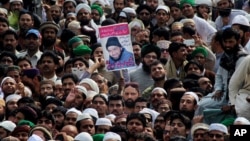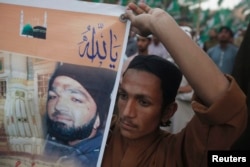Tens of thousands of people in Pakistan Tuesday attended the funeral of a man executed a day earlier for the killing in 2011 of a powerful politician who criticized the country's blasphemy laws.
Funeral prayers for Mumtaz Qadri were held in Rawalpindi’s Liaquat Bagh park, the same place where former prime minister Benazir Bhutto was assassinated in December 2007.
The crowd carried the body more than 20 kilometers to bury it in a place called Bhara Kahu, near Islamabad, the nation's capital. All roads leading to Islamabad were blocked for traffic with heavy shipping containers guarded by police in riot gear.
Schools and most marketplaces in Rawalpindi were closed for the day.
Earlier, the crowd chanted slogans in favor of Qadri and against the government and judiciary. His supporters hailed him as a hero and a defender of the faith.
The head of the Council of Islamic Ideology in Pakistan, Maulana Mohammad Shirani, however, said Monday that Qadri was punished for taking the law into his own hands.
“No one is above the law,” Shirani told journalists.
Anti-media sentiment seemed high among the crowd Tuesday, possibly due to muted coverage of protests over Qadri’s hanging.
Qadri supporters had beaten up some members of the media, including a Reuters cameraman, on Monday and smashed his equipment. Anticipating further violence directed toward them Tuesday, both local and foreign electronic media mostly stayed away from the funeral. No television cameras could be seen on site in a country where such crowds are usually covered live by multiple stations.
Qadri, who worked for the elite unit of the police and was on duty to guard the governor of Punjab province, Salman Taseer, shot him almost 30 times outside a popular market in Islamabad. When Qadri arrived at court to stand trial in Taseer's death, he was showered with rose petals by lawyers who offered to take his case for free.
Taseer was a vocal supporter of a Christian woman, Asia Bibi, who was accused of blasphemy. He wanted the country's blasphemy laws amended.
A few weeks after Taseer was killed, another politician, Minority Affairs Minister Shahbaz Bhatti, was gunned down. Bhatti also advocated reforming the blasphemy laws.
Human rights activists have long complained that the blasphemy laws are abused to settle personal scores or land disputes. People accused of blasphemy, they say, often do not get a fair trial because lower court judges are afraid to rule in their favor.
An accusation of blasphemy is considered a de-facto death sentence in Pakistan. At least 65 people have been murdered in connection with blasphemy allegations since 1990, according to the Center for Research and Security Studies and a tally by the Reuters news agency.
Qadri’s execution, however, shows the government is toughening its stance on hardliners carrying out vigilante justice.





